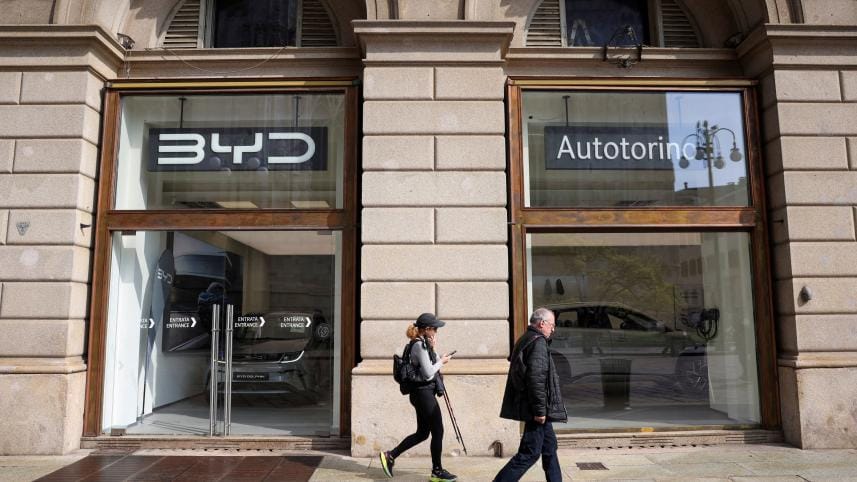European nations compete for Chinese EV factories, jobs even as EU weighs tariffs

European governments may be wary of budget Chinese electric vehicles flooding their markets but they're also fiercely competing for a share of the manufacturing investment and jobs the new competitors bring.
While the European Union investigates China's auto subsidies and considers tariffs on imports, national governments across the bloc are dangling their own incentives to attract Chinese automakers looking to build European factories.
Manufacturing costs for Chinese EV makers including BYD, Chery Automobile and state-owned SAIC Motor are much lower at home but they are nonetheless keen to set up in Europe to build their brands and save on shipping and potential tariffs, said Gianluca Di Loreto, a partner at consultancy firm Bain & Company.
"Chinese automakers know their cars must be perceived as European if they want to bear interest among European customers," he said. "This means producing in Europe."
The EU tariff decision is expected this week. On one hand, import taxes could help European automakers better compete with their Chinese counterparts, but they may also spur on Chinese automakers which are already investing heavily, and for the long-term, in Europe.
Sales of Chinese-brand cars comprised 4 percent of the European market last year and are forecast to hit 7 percent by 2028, according to consulting firm AlixPartners.
Hungary, which produced around 500,000 vehicles in 2023, secured the first European-factory investment by a Chinese automaker, announced last year by EV giant BYD which is also considering a second European plant in 2025.
Budapest is also negotiating with Great Wall Motor for its first European plant, local media have reported, with the country offering cash for jobs creation, tax breaks and relaxed regulation in targeted zones to attract foreign investment.
Hungary has spent more than $1 billion in recent years to support new battery plants of South Korean groups SK On and Samsung SDI and Chinese battery giant CATL's planned factory.
Representatives of BYD, Great Wall and Hungary did not respond to requests for comment.
China's Leapmotor will use existing capacity of Franco-Italian partner Stellantis , with Reuters reporting the pair have chosen the Tychy plant in Poland as a manufacturing base.
Poland has a number of programmes currently supporting more than $10 billion of investments, the country's development and technology ministry told Reuters, including one favouring the transition to a net-zero economy and another offering corporate income tax relief, of as much as 50 percent in high-unemployment regions.
Spain, Europe's second largest car-making country after Germany, has secured investment from Chery, which will start production in the fourth quarter at a former Nissan facility in Barcelona with a local partner.
Chery is expected to benefit from Spain's 3.7 billion-euro programme launched in 2020 to attract electric-vehicle and battery plants.
China's Envision Group has already received 300 million euros in incentives under the scheme for a 2.5 billion battery plant creating 3,000 jobs. Spain might also host Stellantis' planned fourth gigafactory in Europe, with CATL.
Chery plans a second, larger facility in Europe, a source with knowledge of the company's plans told Reuters, and has held talks with governments including Rome, which is keen to attract a second automaker to rival Fiat-maker Stellantis.
Italy can tap its national automotive fund, worth 6 billion euros between 2025-2030, for incentives for both car buyers and manufacturers. China's Dongfeng is among several other automakers that have held investment discussions with Rome.
Italy's industry ministry declined to comment. Dongfeng and Chery did not respond to requests for comment.
SAIC, owner of the venerable MG brand, aims to build two Europe plants, two sources familiar with the matter told Reuters.
The first, based at an existing facility, could be announced as early as July and would employ a kit-assembly technique, targeting annual production of up to 50,000 vehicles, one of the sources said. SAIC's second European plant would be built from scratch and produce up to 200,000 vehicles annually, the source added.
Germany, Italy, Spain and Hungary were on SAIC's location shortlist, the source said.
SAIC did not respond to a request for comment.
In Europe, Chinese automakers face higher costs for everything from labour to energy to regulatory compliance.
But costs for exporting made-in-China cars can add up quickly and threaten already narrow margins.
Bain & Company's Di Loreto said a 15,000-euro car produced in China requires shipping-and-logistics costs of between 500 and 3,000 euros.
Chinese automakers may find labour costs in Northern Europe too high for competitive production, Di Loreto said, whereas further south, Italy or Spain offer a balance of lower labour costs and relatively high manufacturing standards - particularly important for premium vehicles.
For lower-cost vehicles, Di Loreto said, attractive locations include Eastern Europe and Turkey, which currently produces around 1.5 million cars annually, mostly for the EU, and has held talks with BYD, Chery, SAIC and Great Wall.
Turkey's customs union with the EU and free trade deals with non-EU countries guarantee tariff-free vehicle and component exports.



 For all latest news, follow The Daily Star's Google News channel.
For all latest news, follow The Daily Star's Google News channel.
Comments